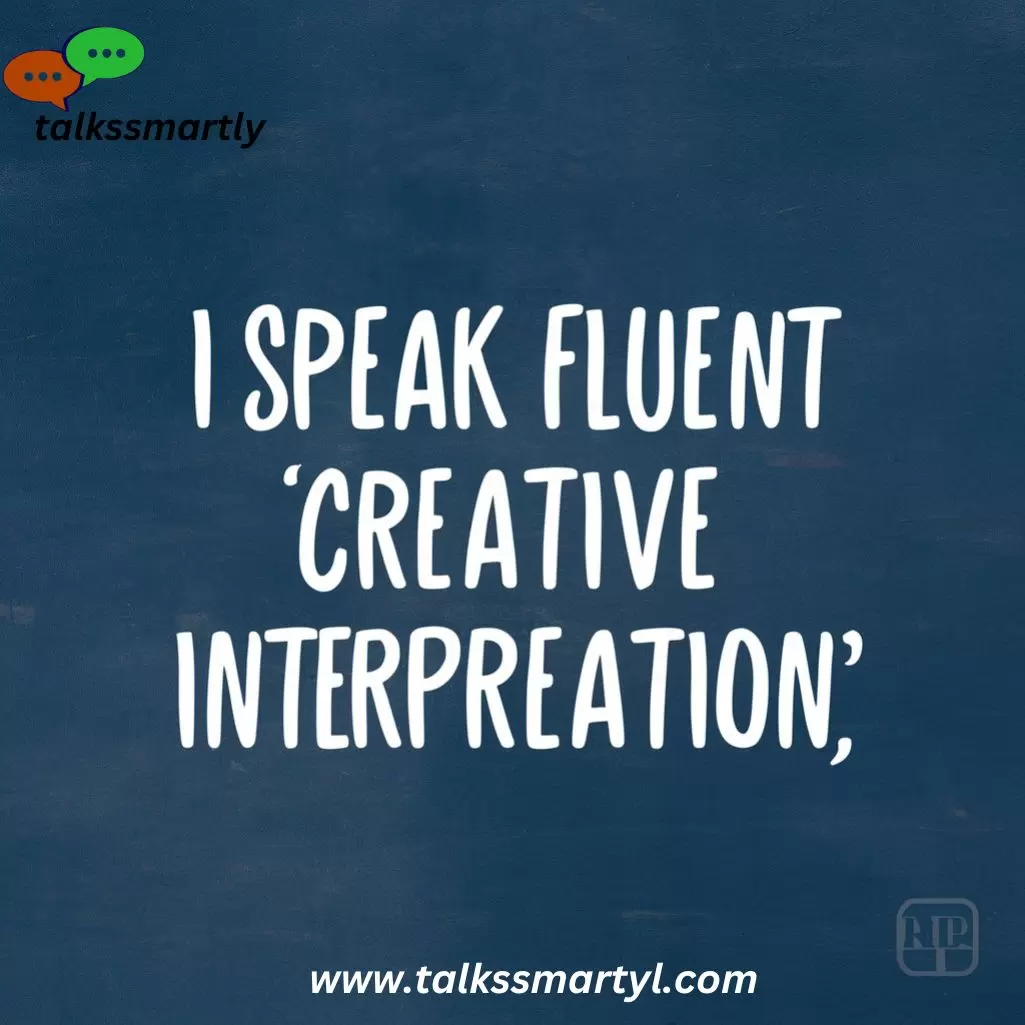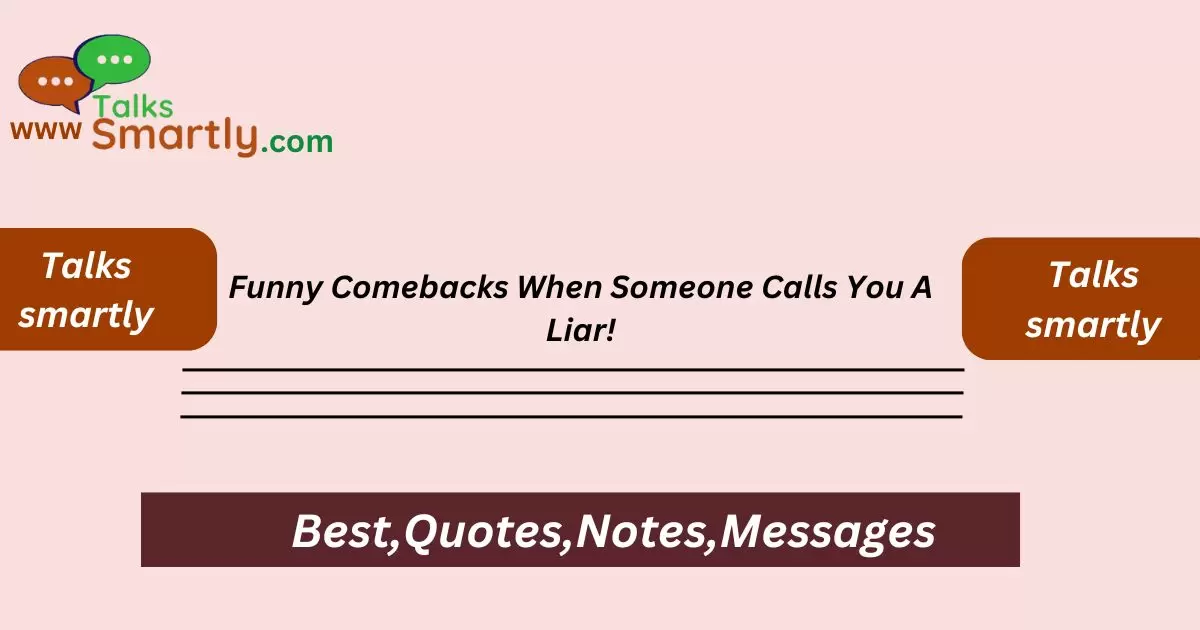Introduction
Navigate accusations of dishonesty with humor using these 25+ funny comebacks! Lighten the mood and defuse tension with witty responses like, “I’m not lying, I’m just telling alternative truths.”
Navigating accusations of dishonesty can be tricky, but injecting a dose of humor can often lighten the mood and defuse tension. Whether you find yourself playfully accused or in a more serious conversation, having a repertoire of funny comebacks can be invaluable.
These witty responses not only acknowledge the accusation but also add a humorous twist, showing that sometimes truth can be subjective or simply open to creative interpretation.
Here are over 25 hilarious comebacks to keep in your back pocket when someone calls you a liar!
Funny Comebacks When Someone Calls You A Liar!
“I’m not lying, I’m just telling alternative truths.”
- This comeback suggests that what you’re saying might be a different perspective or interpretation rather than a straightforward lie. It plays on the idea that truth can be subjective.
- Example: When someone accuses you of lying about a story, you can respond with this to imply that your version of events is just a different way of looking at things.
“I must have misremembered the facts.”

- This is a light-hearted way to admit that your memory might not be entirely accurate without conceding to outright lying. It suggests innocence or a harmless mistake rather than deliberate deception.
- Example: If someone claims you said something you don’t remember saying, you can use this comeback to playfully question your own memory.
“My reality is just more flexible than yours.”
- This comeback humorously suggests that your version of events is more adaptable or open to interpretation compared to someone else’s more rigid view of truth.
- Example: If someone challenges your version of a story, you can respond with this to imply that your reality allows for a bit more creative interpretation.
“I prefer to think of it as strategic truth-telling.”
- This phrase implies that there’s a purpose or strategy behind how you convey information, hinting at a calculated way of presenting facts rather than straightforward honesty.
- Example: Use this when you want to suggest that your choice of words or details in a story serve a purpose beyond just stating the truth plainly.
“Who needs truth when you can have imagination?”
- This comeback humorously suggests that you prioritize creativity or imagination over strict adherence to facts, implying that your storytelling may be more entertaining than factual.
- Example: When recounting an event with embellishments, you can use this comeback to acknowledge that you might have added some flair to the story.
“I’m a fiction enthusiast, what can I say?”
- This response humorously admits to enjoying storytelling and fictionalizing events, suggesting that your penchant for storytelling might blur the lines between fact and fiction.
- Example: If someone questions the accuracy of your story, use this comeback to playfully admit that you enjoy making stories more interesting.
“You caught me… using my imagination.”
- This comeback humorously admits to using creativity or imagination in your storytelling, suggesting that your narrative might include elements beyond strict truth.
- Example: If someone calls you out on a detail in your story, use this comeback to acknowledge that your storytelling might include some imaginative elements.
“I must have been speaking in hypotheticals again.”
- This phrase suggests that you were discussing possibilities or scenarios rather than stating actual facts, implying that your conversation was more theoretical than literal.
- Example: If someone accuses you of exaggerating a situation, you can use this comeback to imply that you were speculating rather than lying.
“I’m just practicing my storytelling skills.”
- This comeback implies that your narrative may be more about practicing your storytelling abilities rather than sticking strictly to factual accuracy.
- Example: Use this when someone questions the details of your story to suggest that you’re more focused on storytelling techniques than absolute truth.
Best Ways to Reply to Email Messages from Your Manager or Boss
“I’m not lying, I’m just pre-truthing.”
- This phrase humorously suggests that you’re preparing the ground for the truth by presenting it in a more palatable or interesting way.
- Example: Use this when someone questions your account of events to suggest that you’re setting the stage for the actual truth with a bit of storytelling
“I speak fluent ‘creative interpretation.'”

- This comeback suggests that you have a knack for interpreting events creatively or adding imaginative details to your storytelling.
- Example: If someone questions the accuracy of your account, use this to imply that your version of events includes creative interpretations.
“If lying was an Olympic sport, I’d be a gold medalist.”
- This humorous remark implies that you’re exceptionally skilled at storytelling or exaggeration, likening it to a competitive sport.
- Example: Use this when someone accuses you of embellishing a story to admit to your storytelling prowess in a playful way.
“My lies are like unicorns – magical and rarely seen.”
- This comeback suggests that any inaccuracies in your story are rare and fantastical, playing on the idea that your storytelling is imaginative but infrequent.
- Example: When someone accuses you of stretching the truth, use this to humorously imply that your stories are rare gems of creativity.
“I’m not lying, I’m just putting a creative spin on things.”
- This phrase suggests that you’re adding creativity or a unique perspective to your narrative rather than intentionally deceiving.
- Example: Use this when defending a story that might be seen as exaggerated to emphasize your creative approach to storytelling.
“I call it creative truthfulness.”
- This comeback implies that your version of the truth may include creative interpretations or embellishments, emphasizing a more colorful approach to storytelling.
- Example: Use this when explaining why your version of events might differ slightly from others’, highlighting your unique perspective.
“I was momentarily confused by my own brilliance.”
- This humorous remark suggests that your storytelling or explanation might be so creative that even you were momentarily taken aback by it.
- Example: Use this when recounting a story that might seem exaggerated to admit to the brilliance of your narrative in a playful way.
“I’m just an artist with words.”
- This phrase suggests that you use language creatively to paint vivid pictures or tell compelling stories, acknowledging your skill in storytelling.
- Example: Use this when explaining why your version of events may sound more dramatic or interesting than others’, emphasizing your storytelling ability.
“Why tell the truth when you can make history?”
- This comeback humorously suggests that you prioritize making a memorable impression or story over strict adherence to factual accuracy.
- Example: Use this when defending a story that might be seen as exaggerated to playfully imply that you’re creating history with your narrative.
“Truth is subjective, and I’m exploring my options.”
- This comeback suggests that truth can vary depending on perspective or interpretation, implying that you’re exploring different angles.
- Example: Use this when explaining why your version of events might differ from others’, emphasizing your open-minded approach to truth.
“I’m just adding a dash of fiction to spice up reality.”
- This phrase humorously suggests that you’re enhancing reality with imaginative elements to make your story more engaging.
- Example: Use this when recounting a story that includes some embellishments to playfully admit to adding creative flair to reality.
“I’m a truth bender, not a liar.”
- This comeback suggests that while your version of events may differ, it’s not necessarily intended to deceive but rather to interpret creatively.
- Example: Use this when defending your version of a story that others perceive as exaggerated, emphasizing your intention to present a unique perspective rather than deceive.
“My truth is like a Rubik’s Cube – it takes time to solve.”
- This metaphorical statement suggests that understanding your perspective or version of events requires patience and effort, much like solving a complex puzzle.
- Example: Use this when explaining why your account of events may be intricate or detailed, implying that it requires careful consideration to fully comprehend.
“I’m not lying, I’m just fluent in storytelling.”
- This phrase humorously suggests that your ability to tell stories creatively may sometimes blur the line between fact and fiction.
- Example: Use this when recounting a story that includes imaginative elements to playfully admit to your skill in storytelling.
“I’m a truth innovator, breaking new ground.”
- This comeback suggests that your interpretation or presentation of facts may be unconventional or groundbreaking, emphasizing innovation over strict adherence to conventional truth.
- Example: Use this when explaining a new perspective or interpretation of events that others may find surprising or different.
“I’m just a truth DJ, remixing reality.”
- This metaphorical statement compares your storytelling to the act of DJing, implying that you mix and remix elements of reality to create an engaging narrative.
- Example: Use this when explaining why your account of events may include creative interpretations or embellishments, likening it to DJing tracks to create a unique blend.
“Reality is overrated, don’t you think?”
- This comeback humorously suggests that strict adherence to reality or factual accuracy may not always be as interesting or entertaining as adding imaginative elements.
- Example: Use this when defending a story that includes creative interpretations to playfully imply that reality could benefit from a touch of imagination.
“I’m not lying, I’m just testing your gullibility.”

- This humorous remark suggests that your storytelling or exaggeration is a playful test of others’ ability to discern truth from fiction.
- Example: Use this when recounting a story that includes exaggerations or creative elements to playfully challenge others’ perception of your narrative.
“My words are more like interpretive dance – open to interpretation.”
- This metaphorical statement compares your words to interpretive dance, implying that they may convey meaning in a fluid or subjective manner.
- Example: Use this when explaining why your account of events may differ from others’, emphasizing the subjective nature of interpretation in storytelling.
“If honesty is the best policy, I’m here for the drama.”
- This humorous remark suggests that while honesty is valued, adding drama or creativity to storytelling can make it more engaging or memorable.
- Example: Use this when defending a story that includes dramatic elements to playfully emphasize your intention to entertain or engage your audience.
“I’m not lying, I’m just exploring alternative facts.”
- This phrase humorously suggests that your version of events may differ due to exploring different perspectives or interpretations, sometimes referred to as “alternative facts.”
- Example: Use this when explaining why your account of events may vary from others’, acknowledging that different perspectives can lead to different interpretations.
Suggestions for Using These Comebacks:
Lighten the Mood: These comebacks are designed to inject humor into a potentially tense situation. Use them to lighten the mood and diffuse any tension that arises when someone challenges your version of events.
Maintain Playfulness: Approach these comebacks with a playful attitude. They’re meant to be humorous and light-hearted, not defensive or confrontational. This approach can help shift the focus away from accusations and towards laughter.
Acknowledge Differences: Sometimes people have different perspectives on the same event. Use these comebacks to acknowledge that differences in perception exist and to highlight the subjectivity of truth.
Avoid Defensiveness: Instead of getting defensive when accused of lying, use these comebacks to acknowledge the accusation while redirecting the conversation in a humorous direction. This can prevent escalation and promote understanding.
Enhance Communication: These comebacks can serve as ice-breakers or conversation starters. They encourage a more open and relaxed atmosphere where communication can flow more easily.
Use Appropriately: Consider the context and the relationship with the person accusing you of lying. These comebacks work best in casual or friendly settings where humor is welcome. Avoid using them in serious or formal situations where they might be misunderstood.
Choose Wisely: Select a comeback that fits the situation and your personality. Some comebacks may be more suitable depending on the nature of the accusation and the dynamics of the conversation.
Be Genuine: While these comebacks are humorous, it’s important to maintain authenticity. Use them in a way that reflects your true intentions and feelings about the situation.
Redirect Focus: Use these comebacks to subtly shift the focus away from the accusation itself and towards a more light-hearted and enjoyable interaction. This can help steer the conversation in a positive direction.
Promote Understanding: Ultimately, these comebacks can foster understanding and empathy by showing that differences in perception are natural and can be approached with humor and humility.
Conclusion
In conclusion, employing these 25+ funny comebacks when someone calls you a liar can transform potentially uncomfortable situations into moments of humor and light-heartedness. By using these witty responses, you not only deflect accusations with charm but also foster a more relaxed and enjoyable atmosphere.
Remember, humor has the power to diffuse tension and shift perspectives, emphasizing the playful side of human interactions while acknowledging the subjective nature of truth.
So next time you find yourself in such a situation, embrace these comebacks to turn the conversation into a shared laugh rather than a confrontation.

Hi, I’m Lauren Reynolds, owner of Talks Smartly.
We specialize in wishes, thank you messages, and thoughtful responses for all occasions.
Whether it’s a birthday wish or a heartfelt thank you, we’re here to make your messages shine.
Join us at Talks Smartly and let your words leave a lasting impression.”











